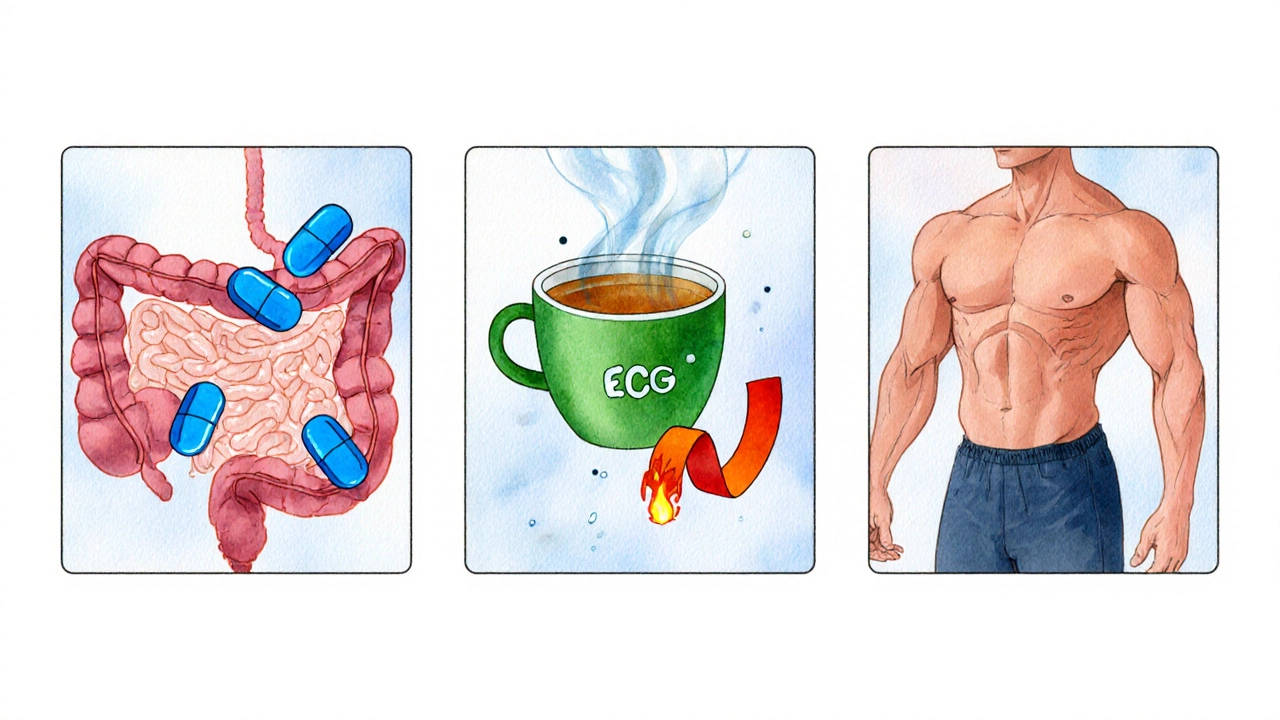
- Oct, 20 2025
- 0
Weight Loss Supplement Selector
Find the evidence-backed supplement that best matches your health profile and weight loss goals
Your Profile
Your Recommended Supplements
Orlistat
RecommendedBlocks 30% of dietary fat absorption
Caution: Not recommended if you consume high-fat meals frequently
Green Tea Extract
RecommendedBoosts thermogenesis and insulin sensitivity
Caution: Avoid if caffeine-sensitive or on blood thinners
CLA
RecommendedHelps preserve lean muscle while burning fat
Caution: Not recommended for liver disease or pregnancy
Important Safety Considerations
Always consult with a healthcare provider before starting any supplement. This tool provides general guidance based on scientific evidence, but individual results may vary.
Disclaimer: This tool is for informational purposes only and does not replace professional medical advice.
Ever scrolled through a sea of pills, powders, and gummies wondering which one actually works? You’re not alone. The market is flooded with promises, but only a handful of supplements have enough science to back their claims. Below we break down the most credible options, how they work, and what to watch out for, so you can choose the best supplement for weight loss with confidence.
What qualifies as a reliable weight‑loss supplement?
Before we name any products, it’s worth defining the baseline. A Weight loss supplement is a product taken orally that aims to accelerate fat loss when combined with a balanced diet and regular activity. Reliable supplements share three traits:
- Peer‑reviewed research showing modest calorie‑burn or appetite‑suppressing effects.
- Well‑documented safety profile at typical dosages.
- Clear labeling of ingredients, dosage, and potential interactions.
If a product can’t tick at least two of these boxes, treat it like a marketing gimmick.
Top three evidence‑backed supplements
Scientific consensus points to three main players that consistently outperform placebos in clinical trials.
- Orlistat is a prescription‑grade lipase inhibitor that blocks about 30% of dietary fat from being absorbed. Studies show an average additional loss of 3-5 kg over six months compared with diet alone.
- Green tea extract, rich in catechins like EGCG, boosts thermogenesis. Meta‑analyses report a 1.3‑kg greater loss after 12 weeks of daily use.
- Conjugated linoleic acid (CLA) helps preserve lean mass while encouraging fat oxidation. Trials find a 0.5‑kg advantage over placebo after three months.
Each of these has a different mechanism, so the “best” choice depends on personal health status, tolerance, and cost.
How each supplement works - the science in plain English
Orlistat works in the gut. It binds to pancreatic lipases, preventing them from breaking down triglycerides. The undigested fat passes through the intestines, which can lead to oily stools if you eat a high‑fat meal. Because it acts locally, systemic side effects are rare.
Green tea extract contains epigallocatechin gallate (EGCG), a potent antioxidant that stimulates the sympathetic nervous system, nudging the body to burn a few extra calories at rest. It also improves insulin sensitivity, making it easier to keep blood sugar stable.
CLA is a fatty acid found in meat and dairy. It appears to modify enzymes that regulate fat storage, directing the body to use existing fat for energy rather than storing new fat.

Safety, side effects, and who should avoid them
Even “natural” supplements can cause problems. Here’s a quick safety snapshot.
| Supplement | Common Side Effects | Contra‑indications |
|---|---|---|
| Orlistat | Oily spotting, flatulence, abdominal cramping | Pregnant or breastfeeding women; chronic malabsorption conditions |
| Green tea extract | Mild jitteriness, upset stomach | People on blood thinners; high caffeine sensitivity |
| CLA | Digestive upset, mild insomnia | Individuals with liver disease; pregnant women |
Always talk to a healthcare professional-especially if you’re on medication or have a chronic condition-before adding any supplement to your routine.
Other popular supplements worth a second look
Beyond the three leaders, several contenders make the rounds in weight‑loss clinics.
- Garcinia cambogia contains hydroxycitric acid, which may curb appetite. Results are mixed; a 2022 review finds only a 0.9‑kg benefit over placebo.
- Caffeine is a proven metabolism booster, increasing calorie burn by 3-4% during short‑term use. Too much can cause anxiety and sleep issues.
- Glucomannan is a soluble fiber that expands in the stomach, promoting fullness. It can aid a 2‑kg loss over 12 weeks if taken before meals.
- Phentermine is a prescription appetite suppressant, generally prescribed for short‑term use (up to 12 weeks). Effective but carries cardiovascular risks.
- Apple cider vinegar is touted for blood‑sugar control; modest evidence suggests a 0.5‑kg loss when diluted and consumed daily.
Most of these are safe at recommended doses, but their impact is usually smaller than the top three.
How to pick the right supplement for you
Think of supplement selection like buying a car: you consider budget, performance, and reliability. Use this quick checklist:
- Medical clearance: Get a doctor’s go‑ahead, especially if you have liver, kidney, or heart issues.
- Goal alignment: Want to curb appetite? Look at Orlistat or Phentermine. Want to boost metabolism? Green tea extract or caffeine.
- Cost vs. benefit: Orlistat is pricey ($80‑$120 per month) but offers the biggest fat‑block effect. Green tea extract is cheap (<$20/month) with modest gains.
- Lifestyle fit: If you travel often, a capsule (CLA) may be easier than a powder (Glucomannan) that needs water.
- Side‑effect tolerance: If oily stools sound terrible, skip Orlistat. If caffeine jitters bother you, avoid high‑dose green tea extracts.
Track your progress for at least six weeks. If you don’t see a 0.5‑kg change, reassess dosage or switch to another option.

Integrating supplements with a clinic‑based weight‑loss program
Weight‑loss clinics often combine nutrition counseling, behavior coaching, and medically supervised supplements. This holistic approach yields better adherence and results.
Here’s how a typical program looks:
- Initial assessment: Lab tests, BMI, medical history.
- Personalized nutrition plan: Calorie goal and macronutrient split.
- Supplement prescription: Based on assessment, the clinician may recommend Orlistat for high‑fat eaters or green tea extract for those sensitive to caffeine.
- Monthly follow‑up: Adjust dosage, monitor side effects, and keep motivation high.
Choosing a clinic that follows evidence‑based guidelines ensures you’re not just popping a pill but receiving a coordinated strategy.
Key takeaways
- Orlistat, green tea extract, and CLA have the strongest research backing for weight loss.
- Safety profiles vary; always consult a healthcare professional before starting.
- Cost, personal goals, and lifestyle determine the “best” supplement for each individual.
- Integrating supplements with professional guidance maximizes results.
Frequently Asked Questions
Can I take multiple weight‑loss supplements together?
Combining supplements can increase the risk of side effects and may not boost results. Most experts advise using one evidence‑based supplement at a time and evaluating its impact for at least six weeks before adding another.
Is it safe to use Orlistat without a prescription?
In many countries a lower‑dose version (available over‑the‑counter) is legal, but a doctor’s guidance is still recommended to monitor nutrient absorption and possible gastrointestinal issues.
How long should I stay on a weight‑loss supplement?
Most studies evaluate 12‑week periods. If you’re seeing steady progress without side effects, a clinician may suggest continuing for up to six months, then reassessing the need.
Do supplements work without diet changes?
Supplements are boosters, not miracles. Without a calorie deficit they’ll have minimal impact. Pairing them with a balanced diet and regular activity is essential.
Are natural supplements always safer than prescription ones?
Not necessarily. Natural compounds can interact with medications or cause adverse reactions. Prescription options like Orlistat undergo rigorous testing, but they still require medical supervision.
Choosing the right supplement isn’t a one‑size‑fits‑all decision. By focusing on proven ingredients, checking safety, and aligning with your personal goals, you’ll give yourself the best shot at losing weight sustainably.
Nikhil Verma
I'm a dedicated physician with a passion for exploring the intricacies of medicine, focusing on the unique healthcare challenges in India. I spend much of my spare time writing articles aimed at improving public understanding of health issues. Balancing my clinical practice and writing allows me to reach a wider audience, sharing insights and fostering a deeper appreciation for medical advancements. I derive immense satisfaction from both treating patients and engaging with readers through my writing.